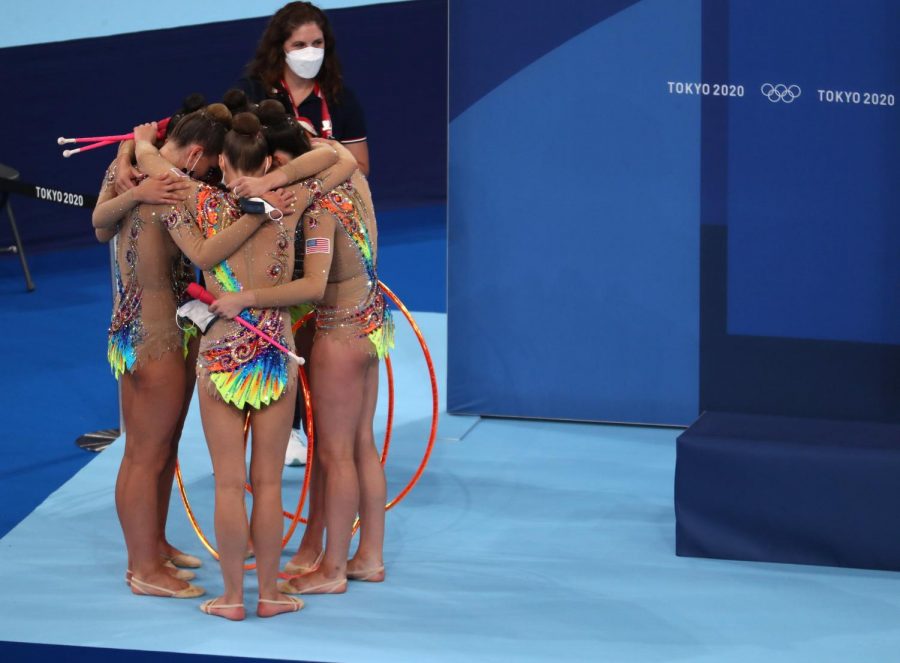Opinion | Olympics serve no modern purpose
Photo Courtesy of Brian Cassella/Tribune News Service
The U.S. rhythmic gymnastics team hug after completing their final routine on Saturday at the Ariake Gymnastics Center during the Tokyo Olympics. Columnist Nathaniel Langley argues that the Olympic host city displaces less affluent communities and expedites gentrification rather than “uniting the world”.
Aug 10, 2021
A particular elation looms every two years as the Olympic Games occur. Rooting for one’s home country, it is not difficult to be caught in the Games’ fervor.
Nevertheless, the delayed and faulty Tokyo Olympics exemplify the rationale as for why the Olympics should end — or, in some measure, commit to one location.
The Olympics — with its calculated and “made-for-TV” grandeur — are no fun and games.
On its exterior, the international athletic competition is marketed as “uniting the world.” However, the only Olympic “uniting” is government-contracted companies uniting to displace less affluent communities and expedite gentrification.
Similarly, politicians “unite” to deliver unprecedented and unchecked powers to local police — including the present example of a dystopian surveillance balloon patrolling Tokyo’s skies.
Get The Daily Illini in your inbox!
With this, the Tokyo Games embody the modern Olympic spirit: Market one’s nation to international capital, accelerate urban development to allure this business and — by any means — make good TV.
The athletic portion of the games only serves as a backdrop for what Olympic hosts genuinely crave: merchandising their nation’s narrative. For Tokyo and the International Olympics Committee, this meant “supporting an industry” and business, not athletes — according to Rob Koehler, director general of Global Athlete.
Likewise, many would assume the IOC’s priority — as the Olympic organizer — is to protect and compensate athletes. Yet, the organization is mainly concerned, as stated in the New York Times, for broadcasting revenues.
Consistently in the news for corruption scandals, Thomas Bach, IOC’s president, made the case for continuing the Olympics worse recently by avoiding questions over the 2022 Beijing Winter Games alongside China’s genocide and imprisonment against Uyghurs and Muslim minorities in Xinjiang.
Notably, it is well within the IOC’s ongoing mission to continue its relationship with authoritarian regimes. With modern games presenting challenges to democracies, a 2017 report by Thomas Könecke and Michiel de Nooij illustrates that the IOC’s dependence on authoritarian governments “helps the IOC to secure the future of its main revenue driver, the Olympic Games, thus providing for its own future.”
Contemporarily, the Olympics are valueless and redundant. In addition to imposing tremendous debts onto cities, the mantra that the Olympics “heal” or “unify a troubled world” is false and deceiving.
Although contentious nations like the United States and China may find athletic terrain more amicable for competition, never will anyone cite the Olympics as a source for peace or easing geopolitical tensions.
Domestically, moreover, the Olympics have the opposite intended effect.
In a poll from May, 80% of the Japanese public opposed hosting the games; 43% favored the games being canceled outright. Correspondingly, Prime Minister Yoshihide Suga enjoyed an abysmal 34% cabinet approval rating — Japan is to hold general elections this fall.
Financial misery also exists with the Tokyo Games costing around $28 billion — far more than the initial expectation of $7.3 billion.
What this colossal cost does not factor, nonetheless, is the human cost of displacement in lieu of erecting Tokyo’s hollowed stadiums.
Quoted in the Los Angeles Times, a homeless Tokyo man declares “lots of homeless people were chased out of here” to make way for rushed gentrification. Many who years before faced the wrath of an earthquake and subsequent tsunami are forced to kowtow to an imposing TV production advertised as an international athletic competition.
Wistfully, the tragedy of Tokyo’s Games is now arriving on American shores.
In 2028, Los Angeles is scheduled to bear the biannual brunt of local destruction. Fortunately, with the help of the NOlympics L.A. movement, the conversation is changing on whether to even stage these Olympics.
NOlympics L.A. is an activist organization demanding the L.A. Olympics not to occur — and, overall, end the obstructive Olympics. Asserted in their platform, NOlympics L.A. accurately explains, “the Olympics destroy communities and kill cities” and drains valuable financial resources away from vulnerable populations into absurd Olympic constructions.
With the L.A. Olympics establishing an official price tag of $6.9 billion — and a more accurate cost around $17.7 billion — the L.A. Olympics already promulgate abuses hosting the Olympics biannually re-introduce.
Furthermore, anxieties grow over increased police funding as the Los Angeles Police Department — a police force noted for its effectiveness at being ineffective — awaits heightened financing to “protect and serve” the city against the wishes of its general population.
The present Olympic games are nothing more than a global competition for broadcasting revenues and bribes to vainly host a TV production and displace “unwanted” populations.
When the public has a legitimate voice on whether or not they host the Olympics — such as voters in Krakow, Munich and Stockholm for the Winter ‘22 games — the only cities left craving the Games lie in authoritarian apples.
Dreadfully distant from the credible spirit the Games once held in ancient Greece, the Olympics today represent more an opportunity for advertising revenue than glorious moments for athletes.
Thus, the outstanding options left for future games are to compete regularly in the Olympics’ motherland — i.e., Greece — or hold no games whatsoever.
A city’s appetite to host the Olympics for economic or “political reconciliation” is as fleeting as ingesting snake oil. With contemporary games depicting absolute detachment from the original Olympic objective of wondrous athleticism and spectacle, the only games left to be played are no games at all.
Nathaniel is a junior in LAS.






